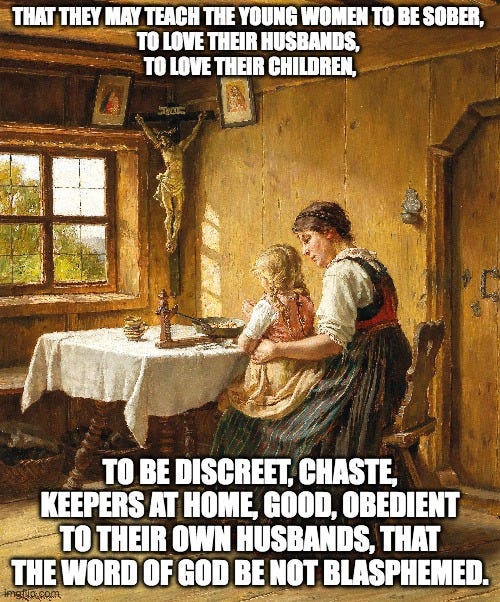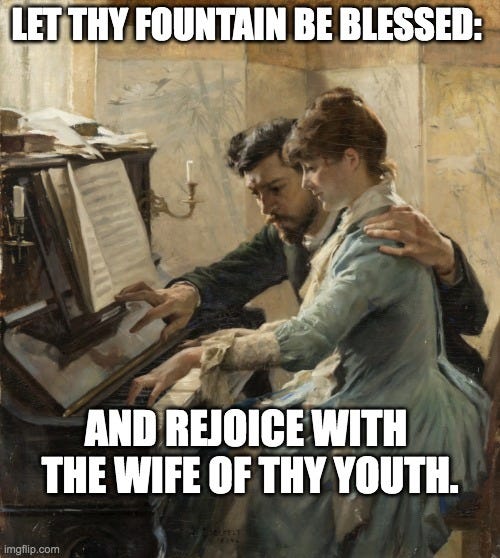Definitions
Definitions are important. But we need to be very careful how we use them.
Youth
YOUTH, noun Yuth. [G.]
1. The part of life that succeeds to childhood. In a general sense, youth denotes the whole early part of life, from infancy to manhood; but it is not unusual to divide the stages of life into infancy, childhood, youth and manhood. In this sense the word can have no plural.
Those who pass their youth in vice, are justly condemned to spend their age in folly.
2. A young man. In this sense it has a plural.
Seven youths from Athens yearly sent--
3. A young person, male or female.
4. Young persons, collectively.
It is fit to youth to read the best authors first.
Websters 1828
I once had a long argument (in person, unfortunately) with a scholar concerning the definition of a word. The issue was Number 30, specifically the vows of women, specifically the vows of the woman that, according to my interlocutor, is not mentioned in the text.
He mentioned that, according to his study, (and I don't in the least downgrade his study) the word ‘youth’ (female) meant a female child of 12 years and under. In his view, then, women over 12, not yet married, fell outside of this text and should be treated like men!
Leaving aside the obvious rejoinder that if they are not covered then shouldn't they fall into the closest category? Shouldn’t we ask who they are most like? Is the age 13-year-old girl more like a boy than like a 12-year-old girl or a married woman?
Leaving that aside, let's talk about the nature of language.
The natural use of language
Say that, in our age and location, it should happen that 17-year-old and a 15-year-old are trapped in a burning building with a bunch of two, three, and four year olds. And suppose that the 17-year-old were to turn to the 15-year-old and say, “We have to get the children out". Then suppose, having succeeded in dropping the ‘children’ out of a window to safety, the 15-year-old and a 17-year-old perish in the fire.
Then the next day the newspapers report that, “Two children perish in fire." Meaning our 17-year-old and 15-year-old. Did the editor make a mistake calling them children? Or did the 17-year-old make a mistake when he excluded himself and his 15-year-old compatriot from the word children?
Or, instead, are we accustomed to the way that languages normally used? Do we recognise that the 17-year-old saw that his and his 15 year old compatriot had responsibility over those much younger than himself, while the editor joined us in mourning the loss of young members of our society?
Age to Age
If a woman also vow a vow unto the LORD, and bind herself by a bond, being in her father's house in her youth;
And her father hear her vow, and her bond wherewith she hath bound her soul, and her father shall hold his peace at her: then all her vows shall stand, and every bond wherewith she hath bound her soul shall stand.
But if her father disallow her in the day that he heareth; not any of her vows, or of her bonds wherewith she hath bound her soul, shall stand: and the LORD shall forgive her, because her father disallowed her.
And if she had at all an husband, when she vowed, or uttered ought out of her lips, wherewith she bound her soul;
And her husband heard it, and held his peace at her in the day that he heard it: then her vows shall stand, and her bonds wherewith she bound her soul shall stand.
But if her husband disallowed her on the day that he heard it; then he shall make her vow which she vowed, and that which she uttered with her lips, wherewith she bound her soul, of none effect: and the LORD shall forgive her.
But every vow of a widow, and of her that is divorced, wherewith they have bound their souls, shall stand against her.
And if she vowed in her husband's house, or bound her soul by a bond with an oath;
And her husband heard it, and held his peace at her, and disallowed her not: then all her vows shall stand, and every bond wherewith she bound her soul shall stand.
But if her husband hath utterly made them void on the day he heard them; then whatsoever proceeded out of her lips concerning her vows, or concerning the bond of her soul, shall not stand: her husband hath made them void; and the LORD shall forgive her.
Every vow, and every binding oath to afflict the soul, her husband may establish it, or her husband may make it void.
But if her husband altogether hold his peace at her from day to day; then he establisheth all her vows, or all her bonds, which are upon her: he confirmeth them, because he held his peace at her in the day that he heard them.
But if he shall any ways make them void after that he hath heard them; then he shall bear her iniquity.
These are the statutes, which the LORD commanded Moses, between a man and his wife, between the father and his daughter, being yet in her youth in her father's house.
Numbers 30:3-16
Reading numbers 30, the natural flow of the text flows naturally from age to age in women's life. She starts as a youth in her father’s house, then moves in her youth to a husband, then is either widowed or divorced. (See Proverbs 2:17, 5:15)
Let me accept ad arguendo (for the sake of argument) the idea that the dictionary (in the days before dictionaries existed) definition of ‘youth(female)’ as applied to females a that time was," female human being under 13 years of age".
(Let me also mention that the word ‘high’ in modern English refers to height… or, metaphorically, some kind of quality of advancement. If someone were, however, to speak of ‘high school’ in modern America, they would be describing neither a very tall structure nor a particularly advanced one.)
So when we hear the word ‘youth’ to describe a young female in Jewish culture during the Mosaic epoch, we are not required to believe that every single use of the word had a hard and fast cut off at the thirteenth birthday. The woman who states that she doesn’t like to date ‘short’ men, is not required to dislike dates with the man that is five foot eight and three quarters if the average man (and thus the end of the definition of ‘short’) is five foot nine. Nor is she required to stop speaking of not liking to date short men.
Again, the passage flows naturally. There is the beginning of a woman’s life, when she is a youth in her father’s house. There is the next stage, where she is a wife in her husband’s house. And then the next natural stage, where she is a widow; or unnatural stage, where she is divorced. Taken naturally, these stages cover all of the normal stages of a normal woman’s life.
So what do we do with the unnatural stages? The woman who is taken captive in war at any age, and thus is with neither her husband nor her father? The woman who, having reached the age to marry, finds herself unmarried? An orphan living with her uncle? What does a natural reading of Biblical case law indicate, how should we interpret these cases?
Well, in my mind, it asks us to seek the closest equivalent. Thus the youth who lives with her uncle would naturally fall into the same class as the youth who lives with her father. The captive should consider her owner in the same light as she would consider her father or husband.
And the woman not yet married should still consider herself under the authority of her father. When even a widow is assumed to go back and live with her father, we shouldn’t assume that the unmarried young woman becomes some sort of independent entity at thirteen!
Even if, which I do not admit, the closest equivalent for the young unmarried woman is the widow or divorcee it is not the man! And even if there is some doubt on this issue, the proper and wise course would be for the woman to ensure that the question never arose. That before even thinking of taking any vow she would first check with her father.
Thank you for reading Von’s Substack. I would love it if you commented! I love hearing from readers, especially critical comments. I would love to start more letter exchanges, so if there’s a subject you’re interested in, get writing and tag me!
Being ‘restacked’ and mentioned in ‘notes’ is very important for lesser-known stacks so… feel free! I’m semi-retired and write as a ministry (and for fun) so you don’t need to feel guilty you aren’t paying for anything, but if you enjoy my writing (even if you dramatically disagree with it), then restack, please! Or mention me in one of your own posts.
If I don’t write you back it is almost certain that I didn’t see it, so please feel free to comment and link to your post. Or if you just think I would be interested in your post!
If you get lost, check out my ‘Table of Contents’ which I try to keep up to date.
Von also writes as ‘Arthur Yeomans’. Under that name he writes children’s, YA, and adult fiction from a Christian perspective. His books include:
The Bobtails meet the Preacher’s Kid
and
Arthur also has a substack, and a website.
Thanks again, God Bless, Soli Deo gloria,
Von




